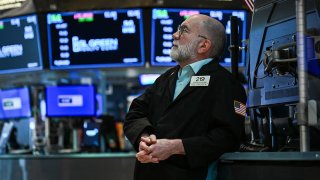- S&P and Nasdaq storm to new records.
- Trump AG seeks release of Epstein’s jury transcripts.
- Japan inflation eases in June.
- The difference between arbitrage vs. market manipulation
- The U.S. consumer pushes back on recession fears.
Despite the noise around tariffs and inflation fears, the U.S. economy seems to be holding its ground — for now. June retail sales came in
stronger than expected
, and weekly jobless claims
dropped below forecasts
.
Stream San Diego News for free, 24/7, wherever you are with NBC 7.
Add to that a solid start to earnings season, and you’ve got a recipe for record highs: both the S&P 500 and Nasdaq notched fresh peaks.
So, is the economy truly resilient in the face of the Trump administration’s shifting trade winds? Or are we simply in the eye of the storm, with August 1 — the Trump tariff deadline — looming on the horizon?
Get top local San Diego stories delivered to you every morning with our News Headlines newsletter.
Remember, economic data is always a step behind. The real impact of tariffs may not show up for months, especially if businesses and consumers are stockpiling ahead of time and
foreign exporters are cutting their prices
.
Even when the new tariffs hit, the effects might be muted at first as inventories clear.
Still, for now, investors can take comfort in the fact that markets are being lifted by fundamentals — not just fear or speculation.
And yes, to borrow a line from Starship: the U.S. economy is still built on rock-solid data… not on rock and roll.
— Lim Hui Jie
Money Report
Investing in Space: The market’s taking off
European shares tick higher as earnings hold the spotlight
Arbitrage versus market manipulation.
The line between arbitrage and market manipulation has long been one of the grayest areas in financial markets — and India’s recent action against high-frequency trading giant Jane Street has brought that murky boundary into sharp focus. Experts
tell us the difference
between the two.
S&P and Nasdaq storm to new records.
U.S. stocks climbed Thursday
due to solid earnings and economic data, with the
S&P 500
up 0.54% for a record close of 6,297.36 — its ninth this year. The tech-heavy
Nasdaq Composite
advanced 0.75% for its tenth record close of 2025, ending at 20,885.65. In Asia, Australian equities notched a record high as other markets traded mixed.
Trump AG seeks release of Epstein’s jury transcripts.
President
Donald Trump
said Thursday night that he had asked
Attorney General Pam Bondi
to seek the
unsealing of grand jury testimony
related to the
criminal prosecution
of the notorious pedophile.
Japan inflation eases.
Core inflation cooled to 3.3% in June, coming down from a 29-month high of 3.7% as rice inflation showed signs of easing. The increase in rice prices eased slightly, rising 100.2% year over year, compared with the
101.7% jump in May
.
[PRO] The U.S. consumer pushes back on recession fears.
U.S. consumers appear to prove economic pessimists
wrong this summer as they flex their spending muscle, according to June’s retail sales report. But some alternative data suggests that the consumer is hanging in there.
Travelers to the US must pay a new $250 ‘visa integrity fee’
Visitors to the United States will need to pay a “visa integrity fee,” according to a provision of the Trump administration’s recently enacted
One Big Beautiful Bill Act
.
The fee applies to all visitors who need
non-immigrant visas
to enter, and cannot be waived.
However, travelers may also be able to get the fees reimbursed, according to the provision.
— Monica Pitrelli
» Read more
Also on CNBC
-
The U.S. economy is not built on rock and roll
-
A flat PPI doesn’t mean the U.S. is unscathed from tariffs
-
U.S. producer prices are flat — but they don’t factor in imports







